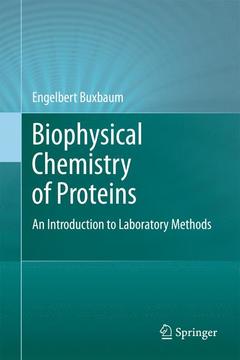Description
Biophysical Chemistry of Proteins, 2011
An Introduction to Laboratory Methods
Author: Buxbaum Engelbert
Language: English
Subjects for Biophysical Chemistry of Proteins:
Approximative price 116.04 €
In Print (Delivery period: 15 days).
Add to cart
Biophysical Chemistry of Proteins
Publication date: 11-2014
510 p. · 15.5x23.5 cm · Paperback
Publication date: 11-2014
510 p. · 15.5x23.5 cm · Paperback
Approximative price 105.49 €
In Print (Delivery period: 15 days).
Add to cart
Biophysical Chemistry Of Proteins : An Introduction To Laboratory Methods.
Publication date: 11-2010
510 p. · 15.5x23.5 cm · Hardback
Publication date: 11-2010
510 p. · 15.5x23.5 cm · Hardback
Description
/li>Contents
/li>Biography
/li>Comment
/li>
The book is structured in nine sections, each containing several chapters. The volume starts with an overview of analytical techniques and progresses through purification of proteins; protein modification and inactivation; protein size, shape, and structure; enzyme kinetics; protein-ligand interactions; industrial enzymology; and laboratory quality control. The book is targeted at all scientists interested in protein research.
Part One: Analytical techniques 1. Microscopy 2. Single molecule techniques 3. Preparation of cells and tissues for microscopy 4. Principles of optical spectroscopy 5. Photometry 6. Fluorimetry 7. Chemiluminescence 8. Electrophoresis 9. Immunological methods 10. Isotope techniques Part Two: Purification of proteins 11. Homogenisation and fractionisation of cells and tissues 12. Isolation of organelles 13. Precipitation methods 14. Chromatography 15. Membrane proteins 16. Determination of protein concentration 17. Cell culture Part Three: Protein modification and inactivation 18. General technical remarks 19. Amine-reactive reagents 20. Thiol- and disulphide reactive reagents 21. Reagents for other groups 22. Cross-linkers 23. Detection methods 24. Spontaneous reactions in proteins Part Four: Protein size and shape 25. Centrifugation 26. Osmotic pressure 27. Diffusion 28. Viscosity 29. Non-resonant interactions with electromagnetic waves Part Five: Protein structure 30. Protein sequencing 31. Synthesis of peptides 32. Protein secondary structure 33. Structure of protein-ligand complexes 34. 3D-structures 35. Folding and unfolding of proteins Part Six: Enzyme kinetics 36. Steady-state kinetics 37. Leaving the steady state: Analysis of progress curves 38. Reaction velocities 39. Isotope effects 40. Isotope exchange Part Seven: Protein-ligand interactions 41. General conditions for interpretable results 42. Binding equations 43. Methods to measure binding equilibria 44. Temperature effects on binding equilibrium and reaction rate Part Eight: Industrial enzymology 45. Industrial enzyme use 46. Immobilised enzymes Part Nine: Special statistics 47. Quality control 48. Testing whether or not a model fits the data Part Ten: Appendix 49. List of symbols 50. Greek alphabet 51. Properties of electrophoretic buffers 52. Bond properties 53. Acronyms
Dr. Buxbaum's research interests are enzymology and protein structure/function relationship. In addition, he has been teaching science and medical students in several countries. He is currently working as associate professor of biochemistry at Ross University School of Medicine.
Focuses on the biophysical chemistry of proteins
Presents an overview of the methods used in protein research
Examines the possible applications and limitations of protein research
© 2024 LAVOISIER S.A.S.




